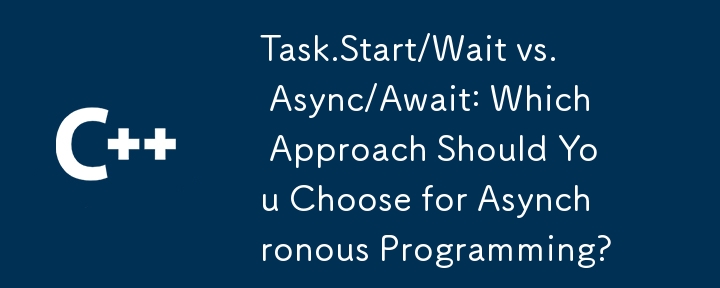

Asynchronous programming: the choice between Task.Start/Wait and Async/Await
Asynchronous programming allows tasks to be executed concurrently without blocking the main thread. Understanding the difference between Task.Start/Wait and async/await can help developers write efficient and responsive code.
Task.Start/Wait
Task.StartNew(Action) Create a new task that executes asynchronously. t.Wait() Blocks the calling thread until the task is completed. MyMethod() creates a task to perform a time-consuming operation (DoSomethingThatTakesTime) and waits for its completion before continuing. Async/Await
async void MyMethod(): Mark the method as asynchronous. await result: Suspends the execution of the current method until the task (result) is completed. MyMethod() Start a task asynchronously and only resume execution after the task is completed. Core Difference
The main difference between the two methods is the threading behavior.
When to use which method
Use Task.Start/Wait when you need to perform a synchronous operation that must be completed before execution can continue.
Use Async/Await when you need to execute long-running tasks concurrently and avoid blocking the main thread. It's ideal for tasks such as database queries, network operations, or UI rendering.
The above is the detailed content of Task.Start/Wait vs. Async/Await: Which Approach Should You Choose for Asynchronous Programming?. For more information, please follow other related articles on the PHP Chinese website!
 Computer screen shows no signal
Computer screen shows no signal
 What does legacy startup mean?
What does legacy startup mean?
 Introduction to Document in JS
Introduction to Document in JS
 Euro-Italian Exchange official app
Euro-Italian Exchange official app
 How to download and save today's headline videos
How to download and save today's headline videos
 Reasons why website access prompts internal server error
Reasons why website access prompts internal server error
 Implementation method of VUE next page function
Implementation method of VUE next page function
 Bitcoin exchange
Bitcoin exchange
 What to do if the chm file cannot be opened
What to do if the chm file cannot be opened




